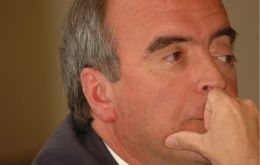MercoPress. South Atlantic News Agency
Tag: Dilma Rousseff
-
Friday, January 29th 2016 - 04:31 UTC
Brazil unveils US$ 20bn credit plan to revive economy; 'raid' on workers' pension funds

Brazil will release 83 billion reais (US$20.4 billion) in new credit from state-run banks for farmers, builders and other businesses suffering in a shrinking economy, resuming stimulus efforts it had largely eschewed in last year's austerity drive.
-
Thursday, January 28th 2016 - 06:49 UTC
Brazil expected to announce massive injection of loans to revive the economy

Brazil’s Finance Minister Nelson Barbosa is expected to announce as much as 60bn Reais (US$15bn) in loans as the government seeks to revive growth amid the worst economic downturn in over a century.
-
Monday, January 25th 2016 - 10:36 UTC
Oil price plunge distorts Brazilian market and leaves Rio cash strapped

Brazil's President Dilma Rousseff approved a resolution to maintain the current system for establishing the minimum price of oil on which royalty payments are paid by state-run oil company Petrobras to local governments.
-
Saturday, January 23rd 2016 - 09:01 UTC
Rousseff eyeing foreign reserves to boost economy and cash strapped government

President Dilma Rousseff said on Friday that her cash-strapped government could consider tapping into Brazil's sizeable foreign reserves at a given moment, an idea that troubles investors already worried about the country's economic decline.
-
Monday, January 18th 2016 - 08:24 UTC
Rousseff eliminates regulations which impeded public universities working with the private sector

Full-time professors at public universities in Brazil will now be allowed to carry out research in the private sector—and get paid for it, without having to drop their academic jobs. The change is the result of a new law, signed by President Dilma Rousseff, designed to bring science and industry closer together.
-
Monday, January 18th 2016 - 08:11 UTC
Rousseff admits a government bailout of indebted Petrobras is a serious option

Brazilian President Dilma Rousseff admitted that a government bailout for the country’s troubled state-controlled oil company Petrobras can’t be ruled out. The company is mired in financial troubles amid a deep decline of global oil prices and a sprawling corruption scandal involving several of its former executives and its largest suppliers.
-
Friday, January 15th 2016 - 09:24 UTC
Desperate for funds Rousseff offers amnesty to holders of undeclared offshore assets

Brazilian President Dilma Rousseff on Thursday signed a bill that gives amnesty to holders of undeclared offshore assets in exchange for a fine, part of efforts to cut a swelling budget gap and revive investment in the recession-hit economy. The law offers amnesty from prosecution to Brazilians if they bring unreported foreign funds home and pay a 30 percent fine in the form of tax.
-
Friday, January 15th 2016 - 09:13 UTC
Petrobras scandal prosecution-informer involves president Rousseff in the scheme

Brazilian president Dilma Rousseff, and three former heads of state have been dragged into the investigation into the huge corruption scheme in the state-run oil firm Petrobras. According to informer Nestor Cerveró, Rousseff was personally involved in negotiations for votes in Congress in exchange for top jobs in Petrobras.
-
Wednesday, January 13th 2016 - 05:06 UTC
Crucial February for Rousseff: economic plan must convince investors and Congress

With her job on the line, Brazilian President Dilma Rousseff is spending January developing an economic plan which she hopes will restore faith in her leadership and weaken looming impeachment proceedings against her.
-
Friday, January 8th 2016 - 11:51 UTC
Rousseff vows 'fiscal belt-tightening' but 'there's no rabbit in the hat' for the current situation

Brazilian president Dilma Rousseff vowed Thursday that her administration would strive for fiscal belt-tightening and look to keep inflation in check in 2016, saying achieving those goals would help lift the economy out of recession.
